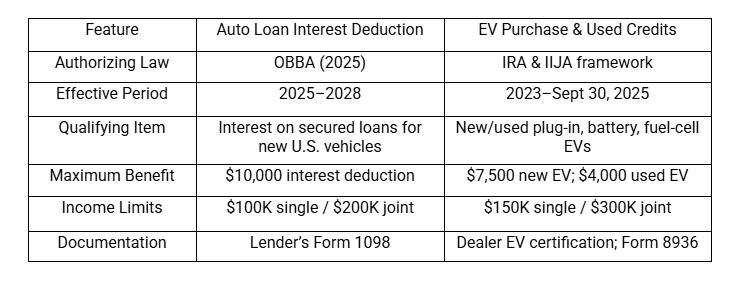Tax Breaks for Car Buyers: Auto Loan Interest Deductions and EV Credits Under Threat
Tax Breaks for Car Buyers: Auto Loan Interest Deductions and EV Credits Under Threat
Purchasing a car ranks among the most significant expenses most households face. Federal tax breaks for auto loan interest and electric vehicle (EV) purchases can deliver significant savings, often in the thousands. The One Big Beautiful Bill Act of 2025 (OBBA) now allows up to $10,000 of interest deduction on new auto loans. Meanwhile, EV tax credits created under the Inflation Reduction Act and backed by the Infrastructure Investment and Jobs Act (IIJA) face an accelerated end date. Understanding both incentives and their deadlines empowers buyers to capture maximum value before these benefits expire.
Auto Loan Interest Deduction
Under the OBBA, borrowers may deduct the interest paid on qualified auto loans, up to $10,000 per year.
- Effective date: January 1, 2025
- Sunset date: December 31, 2028
Vehicle and Loan Qualifications
New vehicles only: Cars, pickup trucks, SUVs, vans, or motorcycles.
- Assembly requirement: Final assembly in the United States.
- Loan type: Secured auto loan, including original loans and refinances of the same vehicle.
- Use: Strictly personal, non-commercial use.
- Income limits (MAGI):
- Single filers ≤ $100,000
- Joint filers ≤ $200,000
Deduction Value and Phase-Out
- Maximum deduction: $10,000 of interest per tax year.
- Phase-out threshold: Begins at $100,000 (single) / $200,000 (joint), reduced by $200 for each $1,000 over the limit.
- Complete phase-out: MAGI reaches $150,000 (single) / $250,000 (joint).
This “above-the-line” deduction applies whether or not you itemize deductions.
EV Tax Credits and Early Termination
The IIJA funded nationwide charging infrastructure, and the Inflation Reduction Act established EV purchase credits. Originally valid through 2032, these credits now end early under the OBBA.
- Credit start: January 1, 2023
- Original end: December 31, 2032
- OBBA end date: September 30, 2025
- Charging-station credit (Section 30C): Ends June 30, 2026
Vehicle and Income Qualifications
- Eligible vehicles: New plug-in hybrids, battery-electric, and fuel-cell electric vehicles for personal use.
- Assembly and sourcing: Final assembly in North America; battery components and critical minerals must meet U.S./North American sourcing rules.
- MSRP caps: ≤ $55,000 for cars; ≤ $80,000 for vans, SUVs, and trucks.
- Income caps (MAGI):
- Single filers ≤ $150,000
- Head of household ≤ $225,000
- Joint filers ≤ $300,000
Credit Amounts
- New EVs: Up to $7,500 per vehicle.
- Used EVs: Up to $4,000 per vehicle.
Effects of Early Termination
- Binding contracts by Sept. 30, 2025: Purchases under contract before this date still qualify for credits.
- Post-Sept. 30, 2025: No new or used federal EV credits remain.
- Charging-station credit: Available only through June 30, 2026.
- State incentives: Some states continue rebates or credits after federal programs end.
Side By Side Comparison

Timing to Maximize Overlap
Between January 1, 2025, and September 30, 2025, both the $10,000 interest deduction and EV credits are active. Buyers can capture both incentives by:
- Financing new EVs in early 2025: Secure a loan before January 1, 2025, or refinances of the same vehicle, to qualify for the $10,000 deduction.
- Signing purchase contracts by September 30, 2025: Ensure binding EV purchase agreements occur by this cutoff.
- Confirming vehicle and income eligibility: Check final assembly, MSRP, and MAGI limits before purchase.
- Documenting interest and EV credit details: Collect Form 1098 from the lender and the dealer’s EV certification.
- Filing timely tax returns: Report the interest deduction on Schedule 1 (Form 1040) and claim the EV credit on Form 8936 for tax year 2025.
How to Claim
Collect documentation:
- Auto loans: Form 1098 showing interest paid.
- EV purchases: Dealer’s certification with VIN, MSRP, assembly location, and battery sourcing.
Complete IRS forms:
- Auto interest deduction: Schedule 1 (Form 1040), Line 13.
- EV credit: Form 8936, “Qualified Plug-in Electric Drive Motor Vehicle Credit.”
Meet filing deadlines:
- Tax returns due April 15 (Oct 15 if extended).
- Check state deadlines for additional EV incentives.
Retain records:
- Keep all documents for at least three years.
Federal tax breaks for car buyers are changing quickly. Be sure to visit irs.gov or talk with a trusted tax professional to get the most up-to-date information on rules, deadlines, and eligibility before you make your purchase. If you have any questions or need help with federal taxes or tax planning, don’t hesitate to reach out to Lamarre Law Group, P.A. Our friendly team has over 10 years of experience helping clients navigate complex tax incentives. Call us at (833) 526-2773 or visit lamarrelawgroup.com to set up a consultation today.


Schedule Your Free
15-Minute Consultation
Ready to speak with a lawyer? Complete the attached form, or give Lamarre Law Group, P.A. a call to get started.
Lamarre Law Group is a virtual office, schedule a meeting for Zoom, Microsoft Teams, Google Meets or by phone.
Lamarre Law Group, P.A.
Hours
Sun: Closed
Mon: 9:00 AM - 5:30 PM
Tue: 9:00 AM - 5:30 PM
Wed: 9:00 AM - 5:30 PM
Thu: 9:00 AM - 5:30 PM
Fri: 9:00 AM - 5:30 PM
Sat: Closed
Leave a Review
Get Directions

